Pound heads to $1.28published at 14:30 BST 11 May 2017
Sterling has slid still further following the Bank of England decision to hold interest rates - it's now at $1.2859.
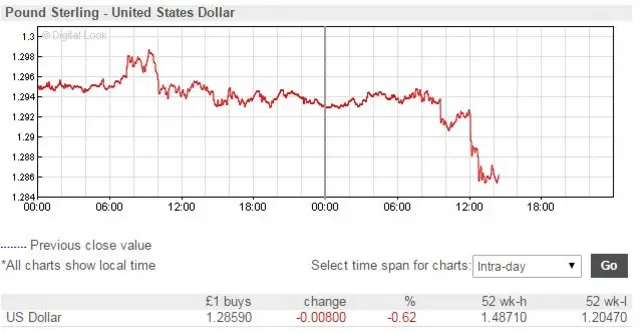
Retail shares drag down Wall Street
Snap's shares fall by more than 20%
Bank of England cuts GDP forecast
Inflation expected to outpace wage growth
BT to cut 4,000 jobs
Snapchat shares plunge
Get in touch: bizlivepage@bbc.co.uk
Karen Hoggan
Sterling has slid still further following the Bank of England decision to hold interest rates - it's now at $1.2859.

Dan Macadam
BBC business reporter
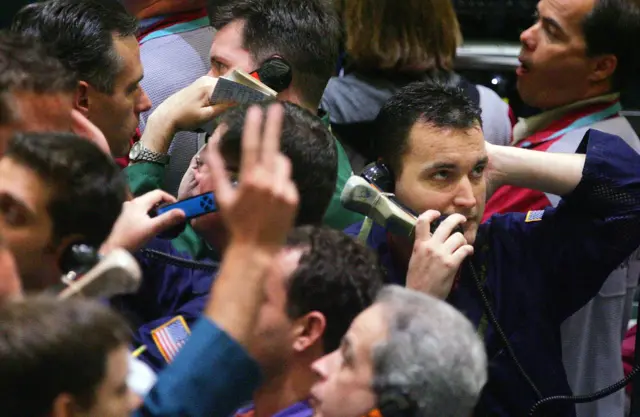 Image source, Getty Images
Image source, Getty ImagesIn the run-up to the Bank of England's announcement at midday and since it's come out, all sorts of strange sounds have been heard on the trading desks.
It's not the frantic phone calls you see in the movies, but sounds of clown horns, door bells and even an air-raid siren.
They're to signal that a large client is taking a big position in the market. But the traders here say it's been a relatively quiet day.
That's because, with interest rates in many major economies still at near 0%, there's much less trading around central banks' decisions on rates.
BBC 5 live business presenter Colletta Smith tweets as the number of people on contracts that don't offer a minimum number of hours' work rises from 5% of contracts to 6%.
Allow X content?
This article contains content provided by X. We ask for your permission before anything is loaded, as they may be using cookies and other technologies. You may want to read X’s cookie policy, external and privacy policy, external before accepting. To view this content choose ‘accept and continue’.
 Kamal Ahmed
Kamal Ahmed
Economics editor
The BBC's economics editor Kamal Ahmed says that the Bank of England has moved into caution mode today.
After two major upgrades to its growth forecasts since the referendum - in November and February - today saw a slight downward revision.
But it is not time to race for the lifeboats.
Bank of England deputy governor for monetary policy Ben Broadbent points out that income growth and wage growth are not the same thing.
"Real wages are falling this year - real incomes in aggregate are not. That's because we've got some employment growth, and it's also because you've got to remember that almost half of household income is not wages - it comes from various other things including pensions both public and private, and those are rising slightly faster than wages."
Why is the Bank confident that wage growth will pick up, BBC economics editor Kamal Ahmed asks Mark Carney?
"There's no guarantee here, this is a forecast," he says. "It's driven off of the tightness in the labour market... there's some catch-up [in productivity growth]... and... we're conditioning on a smooth Brexit process."
Bank of England governor Mark Carney explains why there will be a squeeze on consumers this year.
Allow X content?
This article contains content provided by X. We ask for your permission before anything is loaded, as they may be using cookies and other technologies. You may want to read X’s cookie policy, external and privacy policy, external before accepting. To view this content choose ‘accept and continue’.
Dan Macadam
BBC business reporter
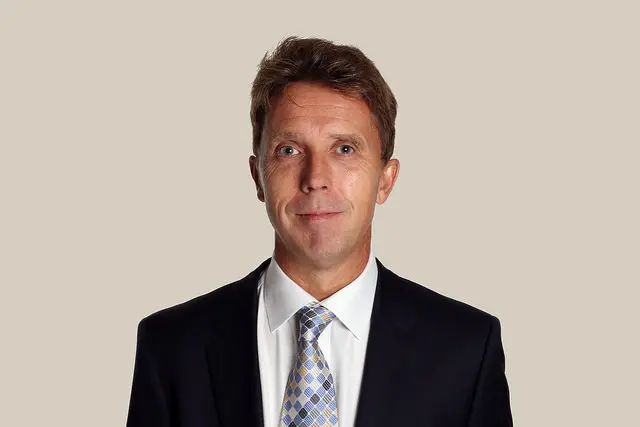 Image source, Bank of England
Image source, Bank of EnglandMichael Saunders (pictured), one of the Bank's interest rate-setters, dropped a hint last month that he was open to raising rates soon, leading to speculation he'd vote for an increase today.
As it turned out, only one member of the Monetary Policy Committee, Kristin Forbes, voted for a rise from the current 0.25% level, as she did at the last meeting in March.
The correction to that speculation is one of the main reasons the pound is falling, analysts at ETX Capital said.
Sterling is now down 0.6% against the dollar at $1.2860 and 0.5% lower against the euro at 1.1846 euros.
While lower productivity and slack in the labour market goes some way towards explaining low wage growth, another factor is the slump in the pound following the Brexit vote, says Bank Governor Mark Carney.
"There is one element that is largely the product of the decision to leave the European Union which is the overshoot of inflation. It's because the currency went down, and the currency went down because of a judgement... of the market that there would be consequences for the UK's medium term prospects and that the exchange rate needed to adjust accordingly," he says.
Allow X content?
This article contains content provided by X. We ask for your permission before anything is loaded, as they may be using cookies and other technologies. You may want to read X’s cookie policy, external and privacy policy, external before accepting. To view this content choose ‘accept and continue’.
The Bank of England left its growth forecasts largely unchanged at below 2% over the next three years, but said those forecasts depend partly on a "smooth" Brexit.
The Bank said it assumes "the adjustment to the United Kingdom’s new relationship with the European Union is smooth, and that Bank Rate follows the market-implied path for interest rates".
By "smooth", Governor Mark Carney tells a press conference that the Bank assumes "that there will be an agreement about future trading arrangements" and that that there will be a transition period to implement the new agreement.
It assumes that there is "no sharp brake or sharper adjustment" he adds.
FastFT deputy head tweets...
Allow X content?
This article contains content provided by X. We ask for your permission before anything is loaded, as they may be using cookies and other technologies. You may want to read X’s cookie policy, external and privacy policy, external before accepting. To view this content choose ‘accept and continue’.
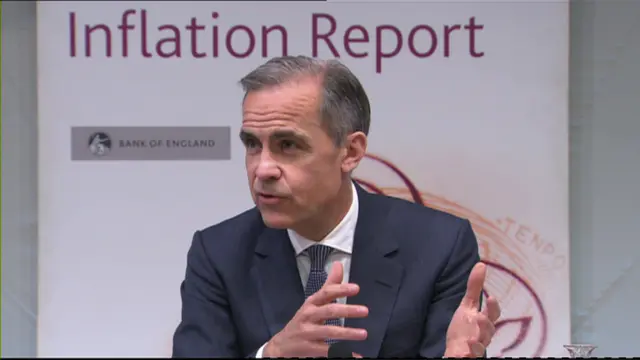
More on Bank of England Governor Mark Carney's press conference.
He says that the actual pace of wage growth has been "relatively slow, relative to past experience" over the past couple of years.
Although a "tremendous amount" of employment has been created, wages are not picking up as much as they would have done in the past.
He says the Bank has been expecting a squeeze on real incomes this year.
"This is going to be a more challenging time for British households over the course of this year. Real income growth... will be negative," he says. "Wages won't keep up with the prices of goods and services."
However, growth will then pick up.
At a "Super Thursday" press conference, Bank of England governor Mark Carney says that wage growth "has been soft in recent years despite strong employment growth".
He adds that while productivity and some labour market slack go towards explaining this, "uncertainty of companies about the outlook may also have made them unwilling to raise wages at a faster pace until they have more clarity about future costs and market access."
But Bank policymakers think these conditions won't persist, and forecast "wages will rise significantly as the output gap narrows."
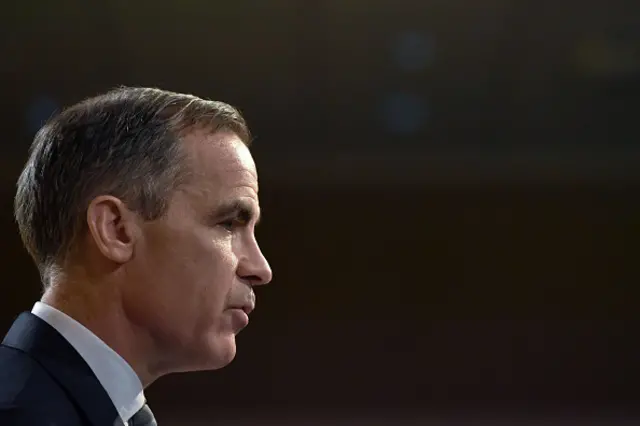 Image source, Getty Images
Image source, Getty ImagesThe Bank of England has cautioned that an expected slowdown in consumer spending "may have started".
It said growth had fallen "markedly" in the first quarter and added a "slowdown appeared to be in train".
This was "concentrated in consumer-facing sectors, consistent with the impact of the fall in the exchange rate feeding through to household income and spending," the Bank added.
Its quarterly inflation report signalled this year would be the worst for the income squeeze, predicting that real wages would begin to pick up over the next three years, while the pound's recent rebound would limit any surge in inflation.
The Times's economics editor Philip Aldrick tweets:
Allow X content?
This article contains content provided by X. We ask for your permission before anything is loaded, as they may be using cookies and other technologies. You may want to read X’s cookie policy, external and privacy policy, external before accepting. To view this content choose ‘accept and continue’.
Dan Macadam
BBC business reporter
The Bank's Monetary Policy Committee voted 7-1 in favour of holding interest rates at their current historic lows, as it did in March.
Some analysts had thought it might have been 6-2 this time round, which would have suggested momentum was building towards a rate rise this year.
"It's as you were," says ETX's head of forex, Richard Wiltshire.
The pound has dropped a bit further after the Bank's decision - it's now down 0.4% at below $1.29.
The Guardian's economic reporter Katie Allen tweets:
Allow X content?
This article contains content provided by X. We ask for your permission before anything is loaded, as they may be using cookies and other technologies. You may want to read X’s cookie policy, external and privacy policy, external before accepting. To view this content choose ‘accept and continue’.
The Bank of England has said a squeeze from Brexit-fuelled inflation on household income has begun and said growth would remain "moderate" after faltering at the start of the year.
Policymakers on the Monetary Policy Committee (MPC) kept interest rates on hold at 0.25% as they nudged down the growth forecast to 1.9% for 2017 from 2% in February after a slowdown in the first three months of the year.
The Bank of England says that it may need to raise interest rates before the late 2019 date markets had been expecting, as it saw inflation rising and the economy growing steadily over the next few years.